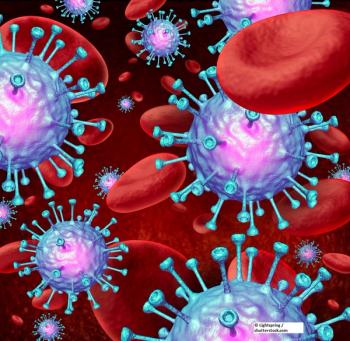Conference Coverage
about 5 hours ago
Tandem 2026: Key Advances in Cellular Therapy and TransplantationTrending on CancerNetwork
FDA Accepts Topical Gel sNDA for Superficial Basal Cell Carcinoma
Joining Commercialization and Innovation to Bring New Cancer Therapies
Remote Exercise Program for Patients With Metastatic Renal Cell Carcinoma Undergoing Immunotherapy: An EXIO Case Series Report
Bridging the "Survivorship Cliff" After Radiotherapy for Breast Cancer
How KTX-1001 May Address Gap in Unique Multiple Myeloma Biologic Subtype
Latest News
Shorts










Podcasts

Spreading Radiation Oncology Advocacy and Education at ACRO Summit 2026
Experts outline current initiatives from the American College of Radiation Oncology as well as potential next steps for advancing the field.

Exploring the Bone Marrow Microenvironment’s Influence on NDMM Trajectory
The immune system is a “critical player” in the emergence and outcome of multiple myeloma, according to Manoj Bhasin, PhD, MS.

How to Responsibly Use AI in Palliative Care and Hematologic Malignancies
In palliative care, AI may serve as a supportive tool rather than a replacement of clinical judgment, said Ram Prakash Thirugnanasambandam, MBBS.

Screening, Prevention, and Intervention on Cervical Cancer Awareness Month
Experts discuss new modalities such as HPV vaccines, balancing hope with realism, and other considerations in cervical cancer management.

Innovation, Elevation, and Empowerment Through Integrative Care in Oncology
Nathan Goodyear, MD, discussed key insights in integrative oncology care as well as evidence-based, patient-centric tools that may optimize QOL outcomes.

Decoding the Top Moments in Prostate Cancer Management From 2025
Experts cover the regulatory approvals and clinical trial readouts from 2025 that may move the needle for prostate cancer management.

Taking the First Steps Beyond the Starting Line With RadOnc on the Run
Host Brandon Mancini, MD, MBA, FACRO, introduces a special podcast series focused on delivering key insights and takeaways in the radiation oncology space.

How Can Bioimpedance Spectroscopy Help Detect Lymphedema More Quickly?
Experts from VCU Massey Cancer Center discuss seamlessly integrating bioimpedance spectroscopy into standard workflows for lymphedema detection.

Bolstering Outcomes and Building Bridges in Integrative Oncology Care
Opening dialogue and establishing connections across different oncology camps may enhance the use of integrative modalities and bolster patient outcomes.

What Were the Key Kidney and Bladder Cancer Advances in 2025?
Experts break down the clinical trial data and regulatory developments that made 2025 a “remarkable year” in kidney and bladder cancer management.
Videos
All News

Investigators of the phase 2b trial will enroll approximately 40 men with advanced prostate cancer to undergo treatment with teverelix.

Data from the phase 1/2 CADENZA trial support pivekimab sunirine as a potential standard treatment for this rare blood cancer population.

HCB101 in combination with HER2-targeted therapy or ramucirumab plus paclitaxel achieved positive responses among patients with first- and second-line gastric cancer.

Developing small molecules that target t(4;14) will be important in multiple myeloma care, according to Saad Z. Usmani, MD, MBA, FACP, FASCO.

Structured exercise interventions may mitigate TRAE, such as fatigue, but data in metastatic RCC are limited.

Vanessa Almendro-Navarro, PhD, MBA, discussed her background as a fellow at Dana-Farber, as well as her experience as a life science executive.

Fumiko Chino, MD, FASCO, discussed the psychological "free fall" patients may experience after completion of radiation therapy for breast cancer.

KTX-1001 may provide a new option for patients with relapsed/refractory multiple myeloma harboring t(4;14).

Aminolevulinic acid plus red lamp therapy was given an sNDA by the FDA for the treatment of superficial basal cell carcinoma.

New guidelines highlight asparaginase as a cornerstone of frontline therapy for adolescents and young adults with acute lymphoblastic leukemia.

The safety profile of amivantamab was consistent with previous reports in this HNSCC population, with no new signals reported.

Urinary toxicity, gastrointestinal toxicity, and sexual function are among the categories that should be tracked when treating patients with inoperable endometrial cancer.

PANOVA-3 findings demonstrated that patients with previously untreated pancreatic cancer experienced better outcomes when adding TTFields to chemotherapy.

Emily Papai, MD, discussed her study on RECIST responses to neoadjuvant radiation in retroperitoneal sarcoma and the challenges of organ-sparing surgery.

Further research will investigate rates of adverse effects among patients treated with liso-cel in the real world vs a clinical trial setting.

Emily Papai, MD, discussed her recent study on radiographic response in retroperitoneal sarcoma and the limitations of neoadjuvant radiation for organ preservation.

Dominique Rash, MD, presented several cases of patients with inoperable endometrial cancer at the 2026 ACRO Summit.

Updated results from the TRIDENT-1 trial support repotrectinib as a new treatment option for those with NTRK fusion-positive advanced solid tumors.

The differences in treatment setting are associational and are likely influenced by confounding by indication and not treatment effects.

Surgical updates for invasive breast cancer from the NCCN Breast Cancer meeting revealed insights on neoadjuvant endocrine therapy and SLNB omission.

Discover how stem cell transplant still deepens myeloma remission, guided by MRD and paired with CAR‑T, bispecifics, and smarter maintenance.

Data from the KEYNOTE-B96 trial support the FDA approval of the pembrolizumab regimen in these gynecologic malignancies.

Nivolumab improved 9-year recurrence-free survival compared with ipilimumab for resected stage III or IV melanoma in the phase 3 CheckMate 238 trial.

According to Dominique Rash, MD, the incidence of inoperable endometrial cancer is rising in the US, and clinicians may encounter it more frequently.

In the future, the multiple myeloma field may gradually shift away from a continuous therapy model to more fixed-duration approaches.

Irpagratinib demonstrated superior survival among patients with hepatocellular carcinoma who were pretreated with ICIs and mTKIs.

A 5-year OS rate of 97.1% was observed among patients who received PSMA PET/CT restaging at first biochemical recurrence following prostatectomy.

Parul Barry, MD, discussed the evolving role of ADCs and targeted therapies in breast cancer, highlighting strategies for sequencing them with radiation.

Experts outline current initiatives from the American College of Radiation Oncology as well as potential next steps for advancing the field.

Michael Buckstein, MD, spoke with CancerNetwork about the benefits of using radiation to treat celiac plexus-associated pain.

The multiple myeloma field may have even better treatment options available by the time some patients experience disease recurrence years down the line.

Confirmed antilymphoma responses occurred in 75% of patients with lymphoma, including 2 with a complete response and 2 with a partial response.

Supporting results for zenocutuzumab in patients with NRG1 fusion–positive CCA come from the phase 1/2 eNRGy trial.

























































